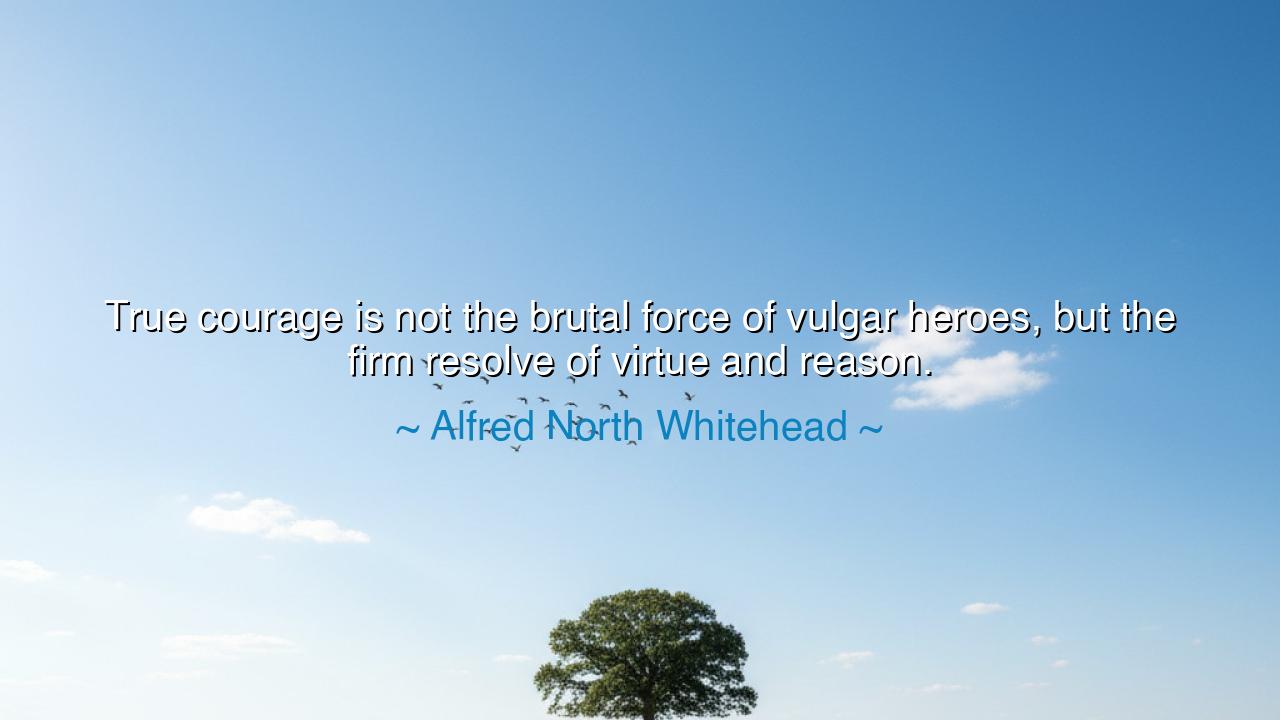
True courage is not the brutal force of vulgar heroes, but the
True courage is not the brutal force of vulgar heroes, but the firm resolve of virtue and reason.






The philosopher Alfred North Whitehead, in his quiet brilliance, once declared: “True courage is not the brutal force of vulgar heroes, but the firm resolve of virtue and reason.” These words, though born in the age of modern thought, echo like a timeless truth whispered from the dawn of civilization. They speak not of the loud courage that roars upon the battlefield, but of the deep, enduring strength that resides within the soul—the kind that endures in silence, that holds steady when fear or temptation would make lesser hearts crumble.
In every age, people have mistaken force for courage. They have worshiped the conqueror, the warrior whose might subdues nations, and the ruler whose word commands obedience. But Whitehead reminds us that such brutal force is not true heroism—it is often the mask of fear, the armor of pride, the echo of insecurity. The courage of the vulgar hero seeks glory; the courage of the virtuous seeks truth. One seeks to dominate; the other to endure. One rises for himself; the other stands for what is right, even when the world stands against him.
The ancients understood this well. In the dialogues of Socrates, we find the image of a man who refused to flee his trial, though death awaited him. He was offered safety if he would only betray his principles, yet he chose to remain faithful to truth and justice. His courage was not a weapon drawn, but a mind unshaken. Socrates stood as the embodiment of Whitehead’s words—the firm resolve of virtue and reason, stronger than any sword, calmer than any storm. He showed that true bravery is not measured by one’s power to strike, but by one’s ability to stand firm in the light of conscience.
Consider also the life of Mahatma Gandhi, who faced an empire without a weapon in his hand. The world expected blood, but he answered with peace. The rulers had armies, but he had truth. When beaten, he did not retaliate; when imprisoned, he prayed. Yet his resolve broke the chains of millions. That is true courage—the kind born not of rage, but of righteousness. The kind that moves mountains not through violence, but through the steady will of virtue and reason. Gandhi, like Whitehead’s ideal, proved that the soul that governs itself is mightier than any army that governs others.
Such courage is rare, for it is quiet. It demands patience when anger tempts, discipline when chaos reigns, and faith when the night seems endless. The brutal force of vulgar heroes fades with their victories, but the courage of virtue endures beyond death. It is the courage of the healer tending the wounded in war, of the teacher speaking truth in times of ignorance, of the parent who sacrifices in silence for their child’s future. It is the strength of those who act rightly even when none see, who hold fast to goodness not because it is easy, but because it is right.
Whitehead’s wisdom calls us to rise above the noise of false heroism and seek the higher bravery—the courage that thinks, that loves, that forgives. To be guided by reason is to see clearly, to choose deliberately, to act not from impulse but from wisdom. To be guided by virtue is to act with moral strength, to do good not for reward but for the integrity of the soul. Together, these two—virtue and reason—create a courage that neither time nor tyranny can destroy.
The lesson is this: do not mistake loudness for strength, nor violence for valor. True courage is found in the one who keeps faith amid despair, who speaks truth amid falsehood, who stands upright when the world bends. You need no weapon for this kind of bravery—only a clear mind and a steadfast heart. Be guided by virtue, disciplined by reason, and you will possess a courage that no sword can wound, no fire can consume, and no age can forget.
So remember, beloved seeker, the heroes of wisdom are not those who conquer others, but those who conquer themselves. Let your courage be gentle but unyielding, humble but unbreakable. For in the quiet power of virtue and reason, you will find the strength to face every trial—and in your steadfastness, others will find the light of what it means to be truly brave.






AAdministratorAdministrator
Welcome, honored guests. Please leave a comment, we will respond soon